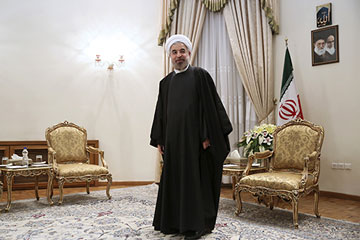
President Rouhani holds the key to Irans economic revival.
More than three decades since revolutionary students stormed its walls and held 52 American diplomats hostage for 444 days, the old U.S. embassy in Tehran seems frozen in time. As I recently observed on an authorized tour, the gold shag carpet is still there, now flattened and filthy. Vintage teletype machines are loaded with tape. Mannequins in disheveled wigs, standing in for embassy staff, sit in a room that was insulated to allow top-secret conversations. Mohammad Reza Shoghi, the docent, rattles on with old anti-American rhetoric. The 9/11 attacks were made up, an excuse to invade Afghanistan. American fashion and television shows are designed by psychologists and politicians to destroy foreign cultures. "Exposure to American ideas makes people feeble," he tells me.
But the bromides about U.S. perfidy no longer reflect the dominant mood in Tehran. Since President Hassan Rouhani's upset victory in last summer's election, Iran has been consumed with a strategic recalibration. The signing of the short-term nuclear deal in November, which diplomats will spend the next six months trying to turn into an enduring pact, generated tangible change in Iran's relations with the world. And among ordinary Iranians, it's no longer off-limits to talk openly about eventual reconciliation with a country long known as the Great Satan.

